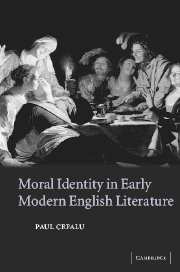Book contents
- Frontmatter
- Contents
- Acknowledgments
- Introduction: English Protestant moral theory and regeneration
- Chapter 1 Shame, guilt, and moral character in early modern English Protestant theology and Sir Philip Sidney's Countess of Pembroke's Arcadia
- Chapter 2 The three orders of nature, grace, and law in Edmund Spenser's The Faerie Queene, Book II
- Chapter 3 Conformist and puritan moral theory: from Richard Hooker's natural law theory to Richard Sibbes's ethical occasionalism
- Chapter 4 The elect body in pain: Godly fear and sanctification in John Donne's poetry and prose
- Chapter 5 Absent neighbors in George Herbert's “The Church,” or Why Agape becomes Caritas in English Protestant devotional poetry
- Chapter 6 Moral pragmatism in the theology of John Milton and his contemporaries
- Epilogue: theorizing early modern moral selfhood
- Notes
- Index
Chapter 3 - Conformist and puritan moral theory: from Richard Hooker's natural law theory to Richard Sibbes's ethical occasionalism
Published online by Cambridge University Press: 22 September 2009
- Frontmatter
- Contents
- Acknowledgments
- Introduction: English Protestant moral theory and regeneration
- Chapter 1 Shame, guilt, and moral character in early modern English Protestant theology and Sir Philip Sidney's Countess of Pembroke's Arcadia
- Chapter 2 The three orders of nature, grace, and law in Edmund Spenser's The Faerie Queene, Book II
- Chapter 3 Conformist and puritan moral theory: from Richard Hooker's natural law theory to Richard Sibbes's ethical occasionalism
- Chapter 4 The elect body in pain: Godly fear and sanctification in John Donne's poetry and prose
- Chapter 5 Absent neighbors in George Herbert's “The Church,” or Why Agape becomes Caritas in English Protestant devotional poetry
- Chapter 6 Moral pragmatism in the theology of John Milton and his contemporaries
- Epilogue: theorizing early modern moral selfhood
- Notes
- Index
Summary
As Elizabethan poets, Sidney and Spenser witnessed the emergence of the most sustained theological inquiries into the nature of justifying grace and its relationship to regeneration and moral conduct. In the following chapter, I attempt to reconstruct the dogmatic and systematic moral theology of some of the most influential Conformist and Puritan English theologians of the late sixteenth through mid-seventeenth centuries: Richard Hooker, Lancelot Andrewes, William Perkins, and Richard Sibbes. Since I will be arguing that, despite their different doctrinal allegiances, these theologians share the belief that regeneration does not imply incremental moral progress, it will be helpful to review some of the recent revisionist and post-revisionist accounts of the ecclesiological and doctrinal disputes between early modern English Conformists and Puritans.
Revisionist work on the history of English Protestantism has begun to question whether a radical Puritan oligarchy posed an ideological threat to a single-minded Anglican pursuit of a via media between Rome and Geneva. Some well-documented Puritan preoccupations – the double decrees of predestination, vehement anti-popery, a concern with sermon-centered rather than word-centered piety – have now been described as much closer in spirit to the concerns of the established English church than historians had earlier imagined. Nicholas Tyacke argues, for example, that the abiding religious and political skirmishes of the seventeenth century were fought between English Calvinists and Arminians, rather than Conformists and forward English Calvinists.
- Type
- Chapter
- Information
- Moral Identity in Early Modern English Literature , pp. 77 - 114Publisher: Cambridge University PressPrint publication year: 2004



